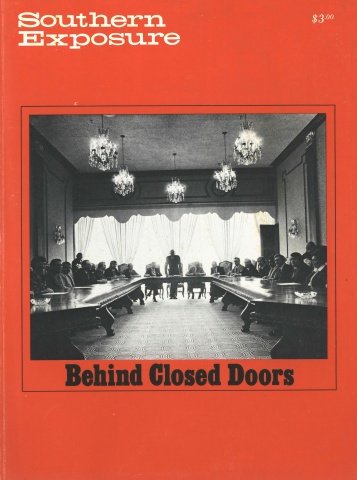Emma’s Story: Two Versions

This article originally appeared in Southern Exposure Vol. 7 No. 1, "Behind Closed Doors." Find more from that issue here.
Emma McCloud lives today in a rented, four-room frame house at the edge of Cherokee City, Alabama. She dresses neatly in pantsuits from the racks of the cheaper department stores, but the linoleum on the floors is cracked. At 62, her only income is the monthly Social Security check. In the winter the oil burner in the middle of the living room half-heartedly fights the cold air seeping in through warped window frames and slanted floors.
On the evening of my first visit, I showed her James Agee and Walker Evans’ Let Us Now Praise Famous Men, the classic portrait of the Depression South. Emma’s daughter, Patricia, whom she calls Sister, asked, “Did they write about you, Mama, in that book?”
Emma wasn’t sure, so I found the place where Agee spreads forth his description of Emma, “rather a big child, sexual beyond propriety to its years.” She tried to read the words, but her eyes are very weak, and even with the thick bifocals the small print was too much for her. She handed the book to Sister and asked her to read it aloud. As she did, first Emma and then the rest of us were transported back to 1934.
Emma was 18 then, had been married for two years to a man 20 years her elder, and was about to leave Alabama to join her husband in the red hills of Mississippi. James Agee, on assignment for Henry Luce’s Fortune magazine, and photographer Walker Evans were staying at Emma’s sister’s home, documenting the life of a family they believed to be representative of white sharecroppers in the South. Emma’s brief visit, the coming together of her kinfolk and her departure to another land gave Agee and Evans more than they bargained for.
As Sister read, Emma kept murmuring, “I remember that,” and “Yes, that’s just the way it was.” When the part came which described the leave-taking, Emma began crying and her emotion filled the room. When Sister finished, Emma began talking about leaving her family and going to the red hills of Mississippi. Then she brightened. “You know, I didn’t know Jimmy [Agee] felt that way. About me and all. He was a good-looking man. And I loved to talk to him, but if I had knowed he felt the way he says he did . . . why, we’d have talked some more.” She chuckled. Her laughter was rich and infectious. We all began to laugh.
The second version of Emma’s story is her own. It was assembled from our taped conversations in November, 1976, and from pages in her diary. Although I have arranged her story in a chronological sequence and used conventional spelling, the words and sentences are her own. I have altered the names of the characters in accordance with Agee’s practice and Emma’s wish. Needless to say, Emma’s experiences, her life and emotions, though simply expressed, are as moving as the eloquent ruminations of her accomplished observer, James Agee.
— Bradford L. Jenkins
Tags
Bradford L. Jenkins
Brad Jenkins teaches sociology and history at Guilford Technical Institute. (1979)